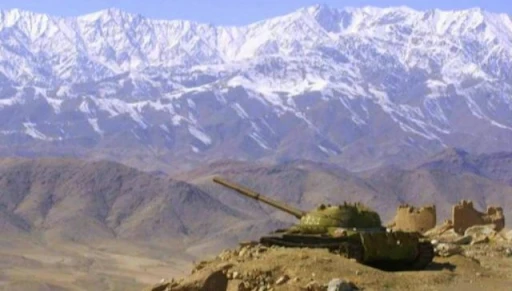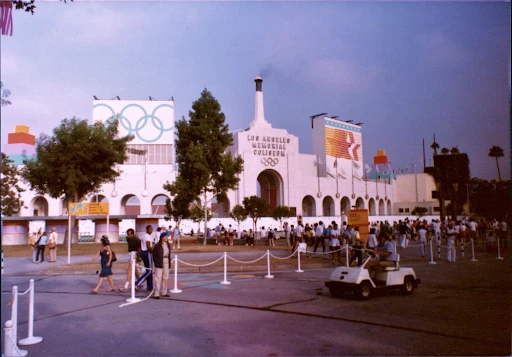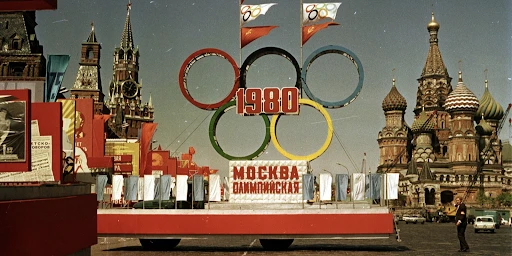The Olympic Games, despite their lofty ideals, have since their inception in ancient Greece intertwined the best of athletic competition with the world of politics. Case in point: The 1980 Summer Games in Moscow, which took place less than a year after the USSR invaded Afghanistan. While there was no way to undo the invasion, the United States wanted to express its disapproval of Soviet actions. It was decided to hit the Soviets where it hurt: their ego. The UK convinced the U.S. to support it in calling for an international boycott of the Olympics. Garnering support for the boycott from within the United States and from other nations as well was not an easy task, especially when the UK and Canada voted in new governments, which then opposed a boycott, and as not-so special envoy Muhammad Ali was himself persuaded by other countries to oppose the very boycott he was supposed to convince them to join.
Nelson Ledsky was made the U.S. Olympics Boycott Coordinator before the Moscow Games of 1980, a role created especially for the games. He was in charge of handling the boycott and all of the chaos that came along with it. Here Ledsky shares his experiences as Coordinator of the boycott, including his efforts to convince the new governments in Canada and the UK to change their positions back in favor of a boycott, and the difficulties he faced persuading the Olympic athletes to stay home.
Ultimately, 60 sixty countries, including most European countries and China, chose to boycott the games that year. (The USSR would exact its revenge by organizing a boycott of the 1984 Olympics in Los Angeles.) Ledsky was interviewed by Thomas Stern starting in June 2003. Read about U.S. Embassy Moscow’s perspective on the boycott.
The British and Canadians convince the U.S. to boycott

Q: We are now in 1980. You became the special assistant to the secretary for the Olympics. Had you had a predecessor?
LEDSKY: As far as I know, I was the first. I think there may have been some officers who were given some responsibilities for previous Olympics, but I don’t believe that any single officer was ever previously designated as the Department’s focal point. My role in 1980 was a new one for the Department.
In late 1979 or early 1980, after the Soviet invasion of Afghanistan, the U.S. looked for actions it could take to express its distaste for Soviet action. I believe that the British and Canadians first suggested that one effective action that could be taken would be for countries to refuse to participate in the Moscow Olympic Games, scheduled for the summer of 1980. The Soviets had devoted much time and attention to making these games a shining example of the prowess of its regime. It was the first time that the Soviet Union or its predecessor regimes had ever been awarded the Olympics and it was going to make it the event of the century. It was, I believe, the conclusion of the British and Canadians that little could be done to reverse the invasion, but they believed that a symbolic act of displeasure was in order and that by not participating in the Olympics we could show that displeasure in a meaningful way.
The British essentially sold this idea to President Carter, who was also looking for public actions to express American disapproval of the Afghanistan invasion. We had only come up with such minor irritants, as a wheat embargo which was bitterly opposed by mid-western farmers. Around the turn of the year 1980, there was an exchange among the British, Canadian and U.S. governments which led to their agreeing to a boycott of the Moscow Olympics. The three governments also pledged to try to get other governments to join the boycott. There were a number of letters exchanged by the three governments at the time. The Department was asked by the White House – Lloyd Cutler (at left), the legal advisor – to coordinate efforts to have other countries join the boycott. The Secretary [Cyrus Vance], Cutler and [Deputy Secretary of State Warren] Christopher met and agreed that the Department should take the leadership in coordinating the U.S. government’s boycott. This was about January 1980.
In January, I was called to Christopher’s office. I had tentatively been selected to be nominated as our Ambassador to Uganda. I had told [Assistant Secretary for African Affairs] Dick Moose that I would be interested in an ambassadorial assignment, but not Uganda because of my wife’s health condition….In any case, Christopher asked me to undertake the Olympic boycott coordinator’s role. I said “yes” somewhat reluctantly, since I thought I would be going to an ambassadorial post overseas. Christopher was very understanding; he understood my dilemma and I think appreciated that I agreed to undertake the coordinator’s role. We both may have thought that by the end of the summer of 1980, I would find another acceptable assignment and this coordinator role was just a temporary bridge. I think they all thought that Carter would be re-elected and that an ambassadorial position could be found for me….
Check That – The UK and Canada are now staunchly opposed
I knew nothing about the subject matter. I knew very little about Olympic sport events. I knew nothing about boycotts. Christopher’s request came as a bolt out of the clear blue sky. I knew that the Olympics would be held, but that was about the extent of my knowledge of the whole subject. Eventually, someone reached the decision that my office would be part of the Secretariat. I would be assigned four or five people and my main role would be to co-ordinate with the British and the Canadians to implement the boycott.

I don’t think anyone in early 1980 knew what had to be done. The job description still had to be written.
We quickly discovered that our first task was to convince the U.S. Olympic Coordinating Committee to agree with the government’s boycott policy. President Carter did not have the authority to deny American athletes participation in Olympics. We had to convince the Committee that it should support the boycott. We also had to convince the British and Canadians to bar their athletes from participating in the Olympics. That was also a tough task because the British Olympic Committee was entirely independent, as was its Canadian counterpart, both in a similar way to ours.
As we began to work on this facet of the boycott, I soon found out that the opposition was very strong and that our policy was about to fail for lack of support from the athletes. In addition, the Canadian government fell and was replaced by a new one, which had not agreed to join the boycott. The British government, previously headed by Callaghan, fell in late 1979 and had been replaced by the new administration of Margaret Thatcher. So, the trio of countries that had agreed to the boycott, all of a sudden shrank to one by early 1980. The British essentially took the position that its Olympic Committee was independent and not subject to governmental direction. They said that if we wanted to try to convince their Committee we were welcome to come to Great Britain to give it a try. The Thatcher government really did not want to get involved.
The new Canadian government, led by Pierre Trudeau, was completely opposed to the boycott, primarily for commercial reasons, that is the sale of Canadian wheat to the Soviets. So, at the start of 1980, there were considerable doubts about President Carter’s policy. Many thought that we should lift the boycott and participate in the Olympics. By this time, the whole issue was in the public domain because the exchange of letters among the three pro-boycott nations had been released to the media….
At some point, Vice President Mondale became involved, so I spent much of my time with White House staffs. No one else in the Department, including Christopher, seemed very anxious to becoming involved. I was essentially left holding the bag.
In early 1980, we drew up a work plan. We sent demarches to many countries – to the Europeans, to Latin American countries, and to African countries. We told these countries that we believed that it was very important that the unlawful Soviet invasion of Afghanistan be publicized and we thought that a boycott of the Olympics would do that. We said we hoped that the games would be canceled, or their importance minimized, if enough countries stayed away. The demarches took different forms. There were some reactions to the demarches that were disturbing. A number of governments said that they would support us. I am not sure that all demarches were welcomed. For example, the Romanians, Liberians and the Chinese said they would join the boycott. The last even pledged to mount a campaign in the Third World to build support; that was not totally welcomed in Washington. The Chinese kept their promise, but were not really very effective. I maintained a dialogue with their embassy in Washington during the spring and summer.
Lloyd Cutler and I took a few trips to Europe in spring and summer of 1980. Our first focus was on Great Britain, where we wanted the Thatcher government to return to the Callaghan policies in support of the boycott. We talked to a number of British sports federations. We spent some time in Geneva talking to the International Olympics Committee, which was most interested in what we were doing. We suggested that the Committee select an alternative venue to Moscow. We also tried to get the Committee or some of the federations to support and participate in the boycott. We were not successful.
In the course of our trips to Europe, we met with a number of delegations, which were affiliated with the IOC. We met with a Korean delegation, which we did convince to join the boycott. We met with the Germans and received Helmut Schmidt’s agreement to talk to the German federation to join the boycott. We met with the Egyptians, who then joined the boycott. We conducted these efforts during the spring and summer and we had some successes. By the time the Olympics opened in Moscow, about sixty countries had joined the boycott.
“By the time Ali returned to the U.S., he was thoroughly confused”
I remember that one of our first fiascoes was the dispatch of Muhammad Ali around the world to speak in favor of the boycott. That was not my idea. We got various bureaus involved in preparing for this presidential envoy. We brought Ali to the Seventh floor [of the Department, where the Secretary and other key officials have their offices] to explain to him what his trip was all about. That was a challenge in itself because he really wasn’t sure where Afghanistan was or why the U.S. government was so upset. We hoped that he would be effective.
The trip was supposed to begin in Nigeria and then move on to a few other African countries and then on to India – four or five places that we had picked which seemed targets of opportunity.
I will not forget what happened in Nigeria. There, Ali, instead of dissuading the Nigerians from participating in the Olympics, was convinced by the Nigerians that Carter’s policy was wrong and that the U.S. athletes should go to Moscow. So, it was back to the drawing board. [Assistant Secretary for African Affairs] Dick Moose and I got on the phone to talk to Ali’s State escort officer. The trip had been well publicized; it would have been very difficult to cancel. So we told the State officer to continue on the trip, but to try to convince Ali before the next stop that the embargo was the right policy. We had to keep going on the trip.
On the next stop, Ali met some Chinese diplomats, who turned him around again and convinced him that an embargo was the right course, that the Soviets were the most evil people in the world and that all people of color should stand against the USSR. It was during this period, that not only did the Chinese convince Ali that a boycott was correct, but they also offered to come to Washington to develop a joint plan, which would give the Chinese the leading role in Africa in bringing those countries to join the boycott.
Ali then went to India, where he was again subjected to arguments in favor of participation and was finally won over to that point of view – again. The Indians convinced Ali that the Moscow Olympics was too important an event to be boycotted, and that furthermore, our stand opposing the invasion of Afghanistan was all wrong. By the time Ali returned to the U.S., he was thoroughly confused. He reported back to us on his trip and then went on his way. We did not use him again! However, I should note that Nigeria and India and some other countries decided in the final analysis not to participate.
Convincing the U.S. Olympic Athletes to Boycott

Lloyd Cutler and I then began to work on the Olympic Committee, which, by the way, we discovered is made up of a couple of dozen independent fiefdoms, each representing a different sport. The Olympic Committee was really a federation. We began to mount a media campaign, stressing the importance of the boycott as a strong gesture of our
disapproval of the Soviet’s actions in Afghanistan. We took our case to the country, trying to marshal as much public support as we could.
I spent a lot of time with the media and appeared on TV on a couple of occasions. Lloyd Cutler made a lot of public appearances. I spent some time on the Hill, although I don’t remember Congress playing a very active role on this issue. There may have been a couple of resolutions passed, but I don’t think they were consequential….
We continued our efforts in the U.S. until April or May 1980, in preparation for a trip that Vice President Mondale, Lloyd Cutler and I took to Colorado Springs to address the U.S. Olympic Committee and to meet with representatives of all American federations. Mondale asked all of the federations not to send their athletes to Moscow. This lobbying effort lasted four or five days with our meeting with each of the many sports federations. Mondale met with Bill Simon, a well- known Republican, who was the head of the Olympic Committee. He did not have a very high regard of Carter or any Democrat, for that matter. In the end, we were successful. The Olympic Committee did vote at the time not to send any teams to Moscow. I must say that I was not very confident that we would win that vote. I was pleasantly surprised when the vote went our way. I think it was sheer patriotism that swung the vote.
We flew back in one of the government’s small jets. It was a happy trip home. It was a big triumph. Then we discovered, after our return, that the Committee’s vote did not bind the individual federations. It was no doubt a significant vote, but there could well have been some slippage in the participation in the Olympics. And in fact, a few U.S. teams did participate surreptitiously, a fact that has been forgotten. So, we did not have a complete boycott. But the vote of the U.S. Olympic Committee allowed us to go back to countries, which up to that time had rejected the boycott notion.
I think, in the final analysis, from our point of view and that of the Soviets, the Olympics were a disaster. NBC withdrew its sponsorship and the Soviets lost $75 million right there. There was no coverage in the U.S. of the Olympics. Those games were not a reflection of the world’s athletic prowess because, although many countries participated, most of the ones with the top- notch athletes (Japan, Pakistan, Korea, the U.S., Australia, New Zealand, all Arab countries, most German teams, a few British teams, and Romania) did not. It was not a world competition and therefore became less than significant in the annals of Olympic sports.
I must say that the Germans complained bitterly, blaming Carter for all sorts of mischief. I think that even if we did not get 100% participation in the boycott (and no one thought that we would) our efforts were successful in the international political arena. There was wide condemnation of the Soviet invasion. Even in countries which participated, there was considerable support for our stand. I should mention that we also became promoters of some sports events in the U.S., in part to allow those athletes that had trained for so long and so hard the opportunity to display their competence….
By the end of the year, we closed down our operations and my stint as the U.S. Olympics Boycott coordinator came to an end. To this day, I am probably still one of the leaders of the “to be avoided” list of the U.S. Olympic Committee and its sport federations.
Of course, on the negative side, our boycott had no impact on Soviet policy in Afghanistan. They did not withdraw or change their Afghan policy at all. But as I said before, our world-wide efforts and our boycott did highlight the Soviet’s nefarious actions. We did get a lot of editorial support, which reflected the mood of the American people after they had a chance to consider the issue. I think that helped the Olympic Committee reach its decision, which, as I said earlier, was really an act of patriotism.
